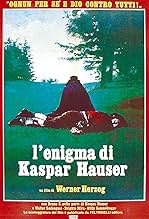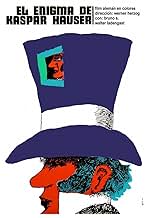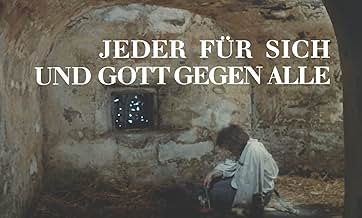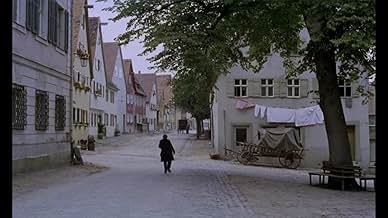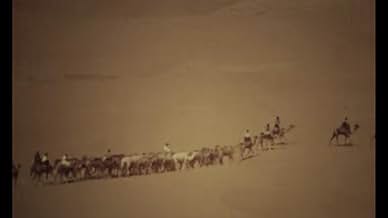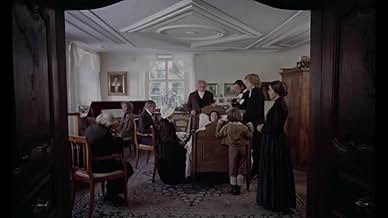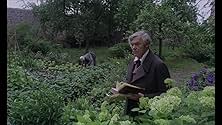IMDb RATING
7.7/10
20K
YOUR RATING
A young man named Kaspar Hauser suddenly appears in Nuremberg in 1828, barely able to talk or walk, and bearing a strange note.A young man named Kaspar Hauser suddenly appears in Nuremberg in 1828, barely able to talk or walk, and bearing a strange note.A young man named Kaspar Hauser suddenly appears in Nuremberg in 1828, barely able to talk or walk, and bearing a strange note.
- Awards
- 5 wins & 3 nominations total
- Director
- Writers
- All cast & crew
- Production, box office & more at IMDbPro
Featured reviews
"This is the story of a soul", someone said and I agree because loneliness is here described through a slow moving plot and endless silences which make us see Kaspar Hauser not as a man but as something more sulfuric, almost a being from outer space. The performance of Bruno S. is simply moving and caused me a lot of tears and the use of time through the narration is perfect for a film of this kind. The poetic vision of Werner Herzog is very peculiar and unique and you can love it or hate it but you cannot ignore it. Herzog doesn't care about the audience, he tells what it wants in the way he likes and that's the praise and the defect of European cinema and it's what makes the difference between European authors and American ones.
A truely visionary work!!I have always been fascinated with the story that this film tells.Herzog seems to be an expert at showing the way that an outsider relates to the world.Bruno S. is amazing in the lead role , Herzog has definitely made the right casting choice.the movie is just a must for all fans of cinema,even if your not a Herzog fanatic you will still be moved by this extraordinary vision!!!
This is the third Werner Herzog film I have watched. The first two were Signs of Life and Aguirre: The Wrath of God. All for themselves and God against All is by far my favorite Herzog movie (and my favorite title). The exploration of Kaspar's primitive mind was fascinating and, at times, even humorous. I enjoyed Kaspar's disdain for the arrogant priests and scientists (but especially the priests!). Like every Werner Herzog movie I've seen thus far, the film does not progress at breakneck speed. This is definitely a turn-off to most movie-goers. I can relate. (Signs of Life had me checking my signs of life). However, I felt that the significant and often humorous dialogue more than made up for the admittedly slow pace.
Werner Herzog's films reach emotional and aesthetic levels that few directors can aspire to. As one of the rare film-maker's more concerned with the artistry of their work than what they achieve at the box office, Herzog is nearly peerless in his purity and ideosynchrasy. Herzog uses the film medium as a moving canvas upon which he expresses, affects, and creates nightmares and dreamworlds which are so vividly real that they threaten our own naturalized consciousness of the projection we call reality.
So much for the postmodern gobbledygook. As you can tell, I love Herzog.
This early film deals with many of the familiar elements that tend to permeate Herzog's films - cultural critique, the insanity of everyday life, alienation, cruelty and power. But here, Herzog uses a true story of 19th century Europe as a vehicle, and treats his subject with an unusual compassion and straightforwardness.
Herzog's incredible casting talent also shows here, just as it does in all of his films. I do not wish to take anything away from the great performers, but really, how does one manage to choose an actor whose life experience is broadly similar to that of Kaspar Hauser's without knowing of it beforehand? This film blends somewhat disjointed artistic imagery with the true story of Kaspar Hauser, a man apart from society who has been kept in a cellar all of his life, and is suddenly expelled into the light in Nuremburg. He is adopted by a kindly old gent who attempts to socialize him in what appears to Kaspar (and perhaps to us through the film's clear vision) an insane society full of lies and contradictions. All of this is done with the believability that is so consistent in Herzog's theatricality, and the visual quality that qualifies him as a true cinematographic artist.
So much for the postmodern gobbledygook. As you can tell, I love Herzog.
This early film deals with many of the familiar elements that tend to permeate Herzog's films - cultural critique, the insanity of everyday life, alienation, cruelty and power. But here, Herzog uses a true story of 19th century Europe as a vehicle, and treats his subject with an unusual compassion and straightforwardness.
Herzog's incredible casting talent also shows here, just as it does in all of his films. I do not wish to take anything away from the great performers, but really, how does one manage to choose an actor whose life experience is broadly similar to that of Kaspar Hauser's without knowing of it beforehand? This film blends somewhat disjointed artistic imagery with the true story of Kaspar Hauser, a man apart from society who has been kept in a cellar all of his life, and is suddenly expelled into the light in Nuremburg. He is adopted by a kindly old gent who attempts to socialize him in what appears to Kaspar (and perhaps to us through the film's clear vision) an insane society full of lies and contradictions. All of this is done with the believability that is so consistent in Herzog's theatricality, and the visual quality that qualifies him as a true cinematographic artist.
Herzog has a way with documenting history as if it was our own past we were re-living. It all seems strangely familiar, yet slightly surreal. This film is rich with detail of the period (19th century), yet it's not the slightest bit in-your-face like so many of the current period films that seem to be about nothing more than lush furniture and the people who sit on them. Yet there are images here that you'll never forget! There are some especially stunning sepia dream sequences of an Arabian caravan strolling in soft, slow-motion across a windswept desert. They reminded me of Sam Fuller's effective use of raw colour footage of distant lands in "Shock Corridor". Images that seem to burst out at us from the B&W angst of a mental ward. Such contradictory images seem perfectly normal in Herzog's world, since after all, they're from the world of our dreams.
As always, Herzog finds great music for his score in this film, and he uses it in a very subtle way. But he also is a master at allowing silences to tell part of his story. If one is really listening, they can hear a great many things that define the world that his characters are inhabiting. This of course, was more obvious in films like 'Aguirre', where one swears they can still hear the wild birds squawking in their head for days! Can any film-going experience be more real?
But this film is not all just sound and imagery! The story is a puzzle. It's up to us viewers to decide who this man is and how his mind functions. It also challenges us to think about how our own minds function. While various "instructors" try to cram a lifetime of education into Kaspar's brain in just a few short years, we are forced to re-evaluate the logic that we have been taught. This is illustrated with great tongue-in-cheek humour when Kaspar approaches a lesson in logic with a Zen-like understanding that leaves his instructors livid. Needless to say, this film is a good preamble to "Being There", only more subtle, more haunting, and far more memorable.
The film will also bring to mind "The Elephant Man", not just in its depiction of circus "freaks", but in its illustrations of cruelty, madness, kindness and alienation. It is in essence, a movie about humanity. Told in a poetic vision with just the right doses of wit, intelligence and mystery. For this is, The MYSTERY of Kaspar Hauser. The film never pretends to be a documentation. It is simply an interpretation. One man's imagining of what might have gone inside the mind of a man who was born into the world at sixteen. See it with that in mind, and you'll have one of the richest movie-going experiences in your life!
As always, Herzog finds great music for his score in this film, and he uses it in a very subtle way. But he also is a master at allowing silences to tell part of his story. If one is really listening, they can hear a great many things that define the world that his characters are inhabiting. This of course, was more obvious in films like 'Aguirre', where one swears they can still hear the wild birds squawking in their head for days! Can any film-going experience be more real?
But this film is not all just sound and imagery! The story is a puzzle. It's up to us viewers to decide who this man is and how his mind functions. It also challenges us to think about how our own minds function. While various "instructors" try to cram a lifetime of education into Kaspar's brain in just a few short years, we are forced to re-evaluate the logic that we have been taught. This is illustrated with great tongue-in-cheek humour when Kaspar approaches a lesson in logic with a Zen-like understanding that leaves his instructors livid. Needless to say, this film is a good preamble to "Being There", only more subtle, more haunting, and far more memorable.
The film will also bring to mind "The Elephant Man", not just in its depiction of circus "freaks", but in its illustrations of cruelty, madness, kindness and alienation. It is in essence, a movie about humanity. Told in a poetic vision with just the right doses of wit, intelligence and mystery. For this is, The MYSTERY of Kaspar Hauser. The film never pretends to be a documentation. It is simply an interpretation. One man's imagining of what might have gone inside the mind of a man who was born into the world at sixteen. See it with that in mind, and you'll have one of the richest movie-going experiences in your life!
Did you know
- TriviaTo perform the scene in which Kaspar learns to walk, actor Bruno S. knelt for three hours with a stick behind his knees until his legs were too numb to stand.
- GoofsIn a brief scene we see a stork eating a frog with its legs tagged (ringed), but bird ringing didn't start until the end of the nineteenth century, decades after the life of Kaspar Hauser.
- Quotes
Opening caption: Do you not then hear this horrible scream all around you that people usually call silence.
- Crazy creditsOpening credits prologue: One Sunday in 1828 a ragged boy was found abandoned in the town of N. He could hardly walk and spoke but one sentence.
Later, he told of being locked in a dark cellar from birth. He had never seen another human being, a tree, a house before.
To this day no one knows where he came from - or who set him free.
Don't you hear that horrible screaming all around you? That screaming men call silence?
- ConnectionsFeatured in I Am My Films (1978)
- SoundtracksCanon in D major
Composed by Johann Pachelbel
- How long is The Enigma of Kaspar Hauser?Powered by Alexa
Details
- Release date
- Country of origin
- Language
- Also known as
- Every Man for Himself and God Against All
- Filming locations
- Croagh Patrick, Westport, Mayo, Ireland(archive footage)
- Production companies
- See more company credits at IMDbPro
Box office
- Gross worldwide
- $3,451
- Runtime
- 1h 50m(110 min)
- Sound mix
- Aspect ratio
- 1.66 : 1
Contribute to this page
Suggest an edit or add missing content


